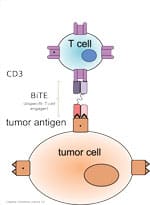New Targeted Immunotherapy for B-cell Lymphoma
The FDA granted accelerated approval to the first bispecific T-cell engager to treat two types of B-cell lymphomas
The U.S. Food and Drug Administration (FDA) has granted accelerated approval to epcoritamab-bysp (Epkinly) for certain patients with diffuse large B-cell lymphoma (DLBCL) and high-grade B-cell lymphoma whose disease did not respond to or relapsed following two or more lines of systemic therapy.
The treatment is approved for a subtype of DLBCL called DLBCL not otherwise specified, including DLBCL arising from indolent lymphoma.

Epcoritamab-bysp is a type of immunotherapy called a bispecific T-cell engager (BiTE). BiTEs are antibodies that can bind two different proteins simultaneously and are used to bring T cells and cancer cells in close proximity to allow the T cells to respond to the cancer cells. Epcoritamab-bysp binds the CD3 receptor present on T cells and the CD20 antigen that is highly expressed on B-cell lymphoma cells.
Epcoritamab-bysp is the first BiTE approved for DLBCL. Other BiTEs have been approved to treat other hematologic malignancies, including blinatumomab (Blincyto), teclistamab (Tecvayli), and mosunetuzumab (Lunsumio).
The approval was based on the open-label, multi-cohort, single-arm EPCORE NHL-1 phase I/II clinical trial, which enrolled patients with relapsed or refractory DLBCL not otherwise specified, including DLBCL arising from indolent lymphoma, and high-grade B-cell lymphoma. Patients had received two or more lines of systemic therapy, including at least one CD20-targeting monoclonal antibody therapy.
The overall response rate in the study efficacy population, consisting of 148 patients, was 61%, and 38% of patients experienced complete responses. The estimated median duration of response was 15.6 months.
The approval of epcoritamab-bysp included a boxed warning indicating that the treatment can cause serious or life-threatening immune-related adverse reactions and should only be administered by qualified healthcare professionals with appropriate medical support.
DLBCL and high-grade B-cell lymphoma are types of non-Hodgkin lymphoma that arise from B cells. DLBCL is the most common form of the disease, accounting for 30 to 40% of all cases. Different subtypes of DLBCL exist. When a case doesn’t fit into any of those subtypes, it is classified as DLBCL not otherwise specified.
According to federal statistics, it was estimated that 80,550 individuals would be diagnosed with non-Hodgkin lymphoma and 20,180 patients would die of the disease in the U.S. in 2023.
The FDA rendered its decision on May 19, 2023. Accelerated approval means that continued approval may be contingent upon a confirmatory trial.
